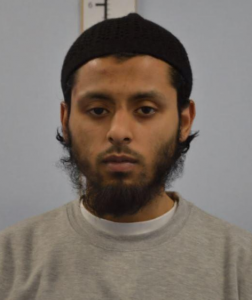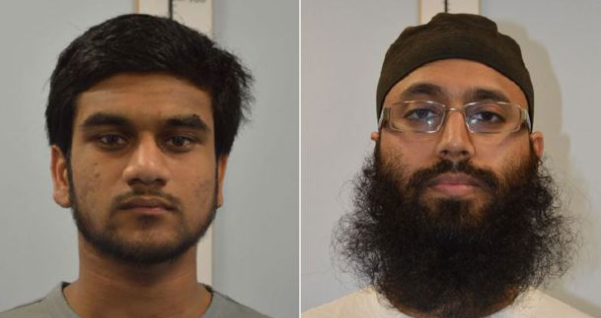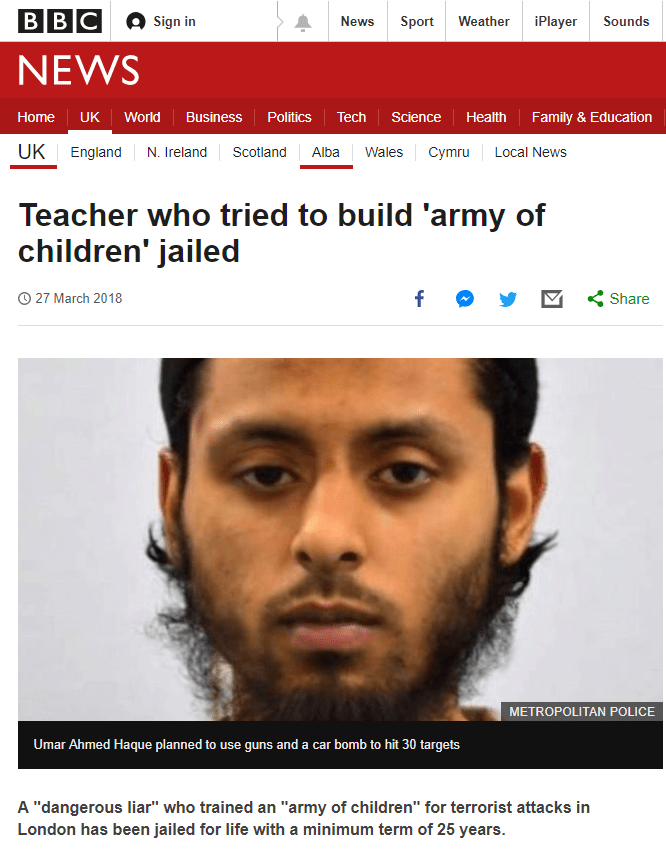In 2018, a group of men who attempted to use children to plan a terror attack in the UK were jailed for more than 42 years.
Click for background:
BACKGROUND

Umar Ahmed Haque
Umar Ahmed Haque first came to the attention of Counter Terrorism Policing officers in April 2016, when police officers stopped him at Heathrow Airport as he attempted to fly to Istanbul in Turkey. While there was no evidence on which Haque could be charged, his passport was revoked by the Home Office under Royal Prerogative.
Evidence subsequently gathered by counter terrorism officers demonstrated Haque had begun planning an attack in the UK. In conversations with Abuthaher Mamun and Muhammad Abid, he discussed various aspects of his plot, from how to increase the strength of a bomb and what type of vehicle to use, to where to carry out an attack and what the police response would be. In a five-hour phone conversation in March 2017, Haque – who was an administrator at an after-school madrasa at Ripple Road Mosque in Barking – told Abid that he had radicalised 16 children.
Police had no intelligence to support this claim, but after arresting the group, detectives continued their enquiries and established the full scale of Haque’s attempt to radicalise children. Social Service workers, together with police, assessed that Haque had attempted to radicalise 55 children aged 11 to 14 years while working at the mosque. Haque’s friend Abid, who he knew from a local mosque, listened at length to Haque’s plans to kill people including his supposed justification for murder; his hypothesis on the police and public response to a multi-pronged attack and how he intended to have “another 30 or 40 men on standby” if he was arrested.

Abuthaher Mamun (left) and Muhammad Abid (right)
It was in one of these conversations that Haque told Abid of his view that the public should be “annihilated”, yet Abid made no attempt to tell police of Haque’s atrocious plans.
Like Abid, Mamun knew Haque from a local mosque and listened to Haque’s plans. He helped Haque strategise, and was planning to take driving lessons so that he could in turn teach some of the children Haque had been attempting to radicalise.
He also made unsuccessful attempts to invest money online in order to raise money to fund Haque’s plans.
On the 27 March 2018 a group of men from east-London involved in a plot to carry out a terrorist attack in the UK using children, were jailed at the Old Bailey, following an investigation by Counter Terrorism Policing.
 The ringleader, Umar Ahmed Haque, was jailed for life and must serve a minimum of 25 years for two counts of preparation of terrorist acts; four counts of collection of information useful to terrorism and one count of dissemination of terrorist publications.
The ringleader, Umar Ahmed Haque, was jailed for life and must serve a minimum of 25 years for two counts of preparation of terrorist acts; four counts of collection of information useful to terrorism and one count of dissemination of terrorist publications.
Abuthaher Mamun who helped Haque plan the attack and tried to raise money to fund the plan, received a special custodial sentence for one count of preparation of terrorist acts. He was jailed for 13 years but is not automatically eligible for parole upon serving half his sentence.
Muhammad Abid, Haque’s confidante as he developed his plan – was jailed for four years and three months for one count of having information about acts of terrorism.
Haque was in the early stages of planning a multi-faceted attack on businesses and communities in London and had been attempting to radicalise 55 children, whom he envisaged would assist him, when police arrested him.
Through their enquiries, detectives identified that Mamun and Abid were assisting Haque, and arrested all three men on 17 May 2017.
The Counter Terrorism Command, assisted by MI5, prevented Haque from pursuing his terrorist plan to target up to 30 groups, businesses and establishments in London.
Deputy Assistant Commissioner Dean Haydon, said: “Haque was a dangerous man who was inspired by attacks in Europe and Westminster. He wanted to orchestrate numerous attacks at once, using guns, knives, bombs and large cars to kill innocent people.
The children were paralysed by fear of Haque, who they understood to have connections to terrorists and who essentially told them that a violent fate would befall them if they told anyone what he was doing. They were too afraid to confide in anyone.
It’s crucial that the police, partners and communities do all they can to identify where young and vulnerable people are being radicalised and I urge anyone with concerns that this is happening to report it confidentially to police.”
What you can do…
The cooperation between the public and the police is a powerful defense against terror.
With the enduring threat, it is now more important than ever that everyone plays their part in tackling terrorism. Your actions could save lives.
That’s why Action Counters Terrorism (ACT) is encouraging communities across the country to help the police tackle terrorism and save lives by reporting suspicious behaviour and activity.
Like other criminals, terrorists need to plan. If you see or hear something unusual or suspicious trust your instincts and ACT by reporting it in confidence at gov.uk/ACT or, in an emergency, dial 999.


